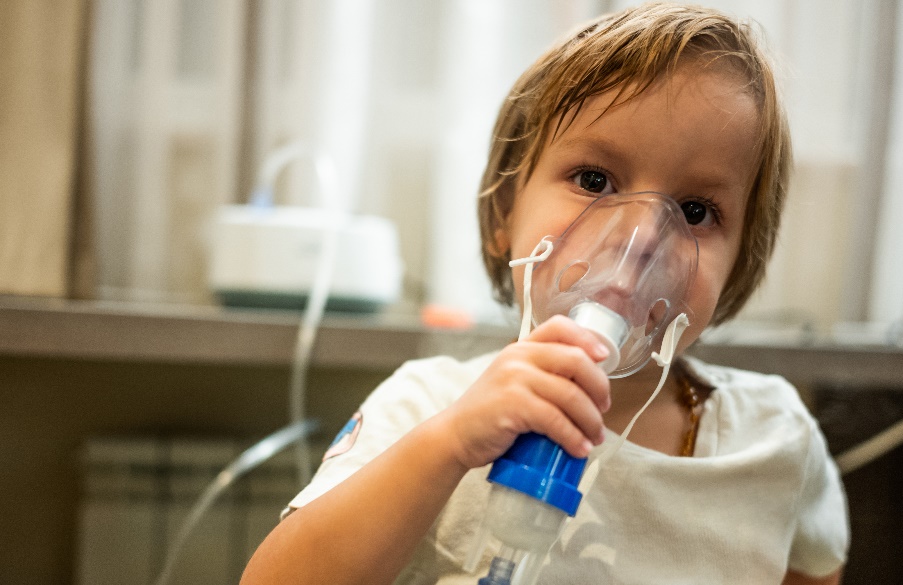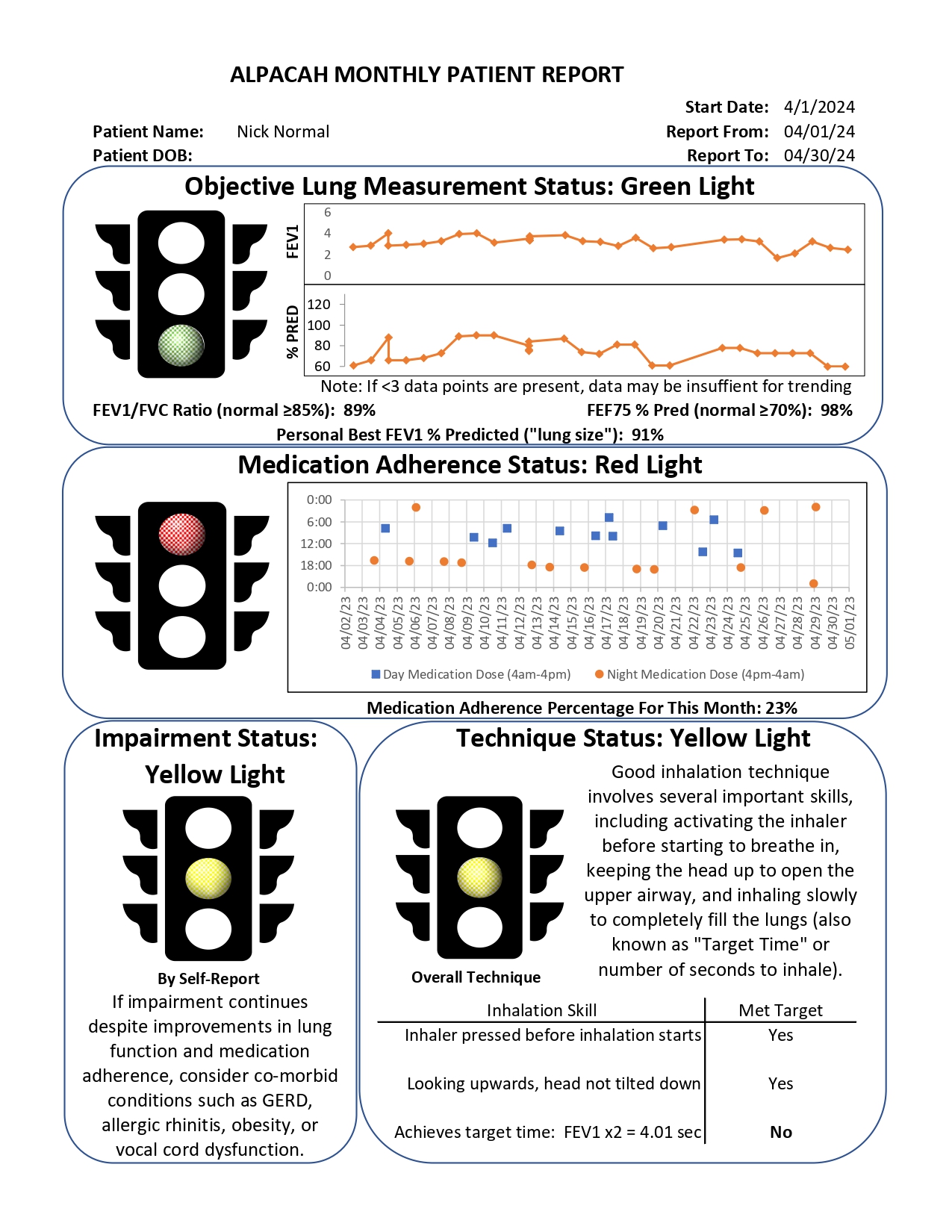What is ALPACAH?
ALPACAH stands for ‘At Last Pediatric Asthma Care at Home.’ It’s a program that wants to help kids younger than 18 years of age who have asthma. The program uses technology to support kids with asthma at home, so they will not need to go to the doctor’s office as frequently and helps prevent the need for urgent care, emergency room, and hospital stays due to their asthma. The program uses things like sensors on inhalers and a special breathing test called spirometry to help see how well a child’s asthma is controlled. This way, kids can get the help they need even if they are not at the doctor’s office.

Who is on the team?
– Asthma Ready® Communities (ARC) is a group of clinicians, nurses, respiratory therapists, researchers, and advocates that specialize in asthma care and education.
– BioSTL’s Center for Rural Health Innovation is a nonprofit organization that works with healthcare groups and community leaders to improve the health of rural communities and drive economic growth.
– NuvoAir is a digital health company that knows a lot about breathing problems and makes the devices to monitor asthma from home.
– Center for Health Policy is a group of policy specialists, health sciences professionals, and analysts that address questions of access to health care, analyze data, and report findings.
What is the study?
The ‘Virtual-Care Solution for Pediatric Asthma Management at Home Study’ is the new model of care in practice and offers services and at-home technology to improve a child’s asthma control. Children with asthma and a parent (or guardian) are being asked to participate in a 12-16 week care coordination program focused on improving your child’s airflow (lung function), reducing symptoms, and increasing asthma control. As part of the ALPACAH program, Asthma Days will be offered at participating clinics and provide an asthma check-up, information for managing asthma and medication, airflow monitoring, and supplies. Children with asthma (and their parent) are being asked to attend an Asthma Day at their local health center, and if eligible for the study, to participate in the intervention or in the observation (control) group. To participate in the intervention the child and parent must have access to reliable internet connectivity in the home and have a SMART phone (or tablet). Participants in the intervention will receive five virtual care management visits, conduct in-home airflow and medication use monitoring, and complete questionnaires. We plan to enroll 215 children in the program. Participants will be compensated with $30 for attending the initial Asthma Day and $100 for completion of the intervention or $50 for serving as a control at the concluding Asthma Day.
Why do we need ALPACAH?
- Uncontrolled Asthma: Many young people struggle with uncontrolled asthma because the current way we give care has problems. Right now, children only see a clinician in a few places like health centers, schools, or hospitals a few times a year when they have breathing problems. This does not always help them or their clinician understand the child’s breathing problems well.
- Not Enough Care Time: The usual places where patients get care may only be open during regular work hours. This can make it hard for them get help when they really need it. This makes life difficult for kids with asthma and can cause them to go to urgent care, the emergency room, or even require a hospital stay.

- Limited Information: The places where patients get care may not always know much about their patients’ daily lives. They only get to see patients when they have appointments, so they don’t know everything about them. For example, the doctor may not know the number of smokers living in the patient’s house. This makes it tough for them to give patients the right care that fits exactly what they need.
- Missing Tools: The places that help patients with their health often do not have the right tools to keep track of and monitor asthma. Without good tools, it’s hard for clinicians to know how patients are doing, what triggers asthma, and how to change the treatment plan accordingly. This missing piece of tracking asthma makes it hard to get the best care possible.
The ALPACAH program will address these issues to help get children’s asthma under control.
If you are interested in participating or have questions, please contact Julie Patterson, ARC Program Coordinator at pattersonjw@umsystem.edu or 573-884-8629.
Questions and Answers
What does ALPACAH do for health centers?
- Getting More Information About Patients: NuvoAir, a company with at-home asthma support, has special devices that use Bluetooth technology. These devices are easy to use at home. They will help health centers know more about each patients‘ asthma situation. They will show them things like how often and well patients use their inhalers and how their lungs are working.
- Connecting with Patients Through Virtual Visits: NuvoAir has a group of experts, including respiratory therapists, nurses, and health coaches. They will help patients and their families get reliable, objective measurements of lung function, called forced expiratory volume in 1 second (FEV1). This helps patients know how well their lungs are doing. They will also help them use their inhalers correctly and give support for their asthma action plans.

- Monthly Reports About Patients: Health Centers will receive reports every month showing how their patients are doing. These reports will share lung health numbers (e.g., FEV1), how well patients are taking their medicine, how well they are using their inhalers, and any changes in their lung condition.
- Support from Asthma Ready Communities’ (ARC) Experts: ARC experts will be there to help health centers and their staff adopt asthma care best practice . They will identify which patients need special help for their asthma and will provide training and support to health center staff.
If you are interested in participating or have questions, please contact Julie Patterson, ARC Program Coordinator at pattersonjw@umsystem.edu or 573-884-8629.
What does ALPACAH do for Patients and Families?
- Better Asthma Care: The ALPACAH program helps improve how we manage asthma. It gives us important information about how the lungs are working and our airflow, how we use inhalers, and if we are taking our medicine. With this information, families and patients can understand asthma better. They can then make smarter choices about their treatment. This leads to better control of asthma, increased activity, and feeling better overall.
- Personalized Help and Learning: ALPACAH’s team of experts works with your care team, like clinicians, respiratory therapists, nurses, and health coaches, to use technology to connect with you. They give personal virtual sessions to improve your inhaler skills and teach you about asthma. You can get this help wherever you are and whenever you need it

- Keeping Track and Feedback: It’s good to keep an eye on asthma regularly. This helps us notice changes early, tailor treatments, and give personal advice. This way, you can learn more about your condition and take charge of your own health. It also helps doctors and families work together to control asthma, feel better, and have a better life.
- Expert Help Available at Home : ALPACAH’s expert team is there to help you when and where it is convenient for you. They keep an eye on you and offer advice. This helps you manage symptoms, stick to your treatment plan, and make smart choices about your health.
If you are interested in participating or have questions, please contact Julie Patterson, ARC Program Coordinator at pattersonjw@umsystem.edu or 573-884-8629.



Photos:
- Baby Alpaca from Heartfelt Alpaca Creations at https://www.heartfeltalpaca.com/
Courtesy of Pixabay:
- Little girl receiving asthma treatment by Skynesher
- Health Care & Medicine by Feodora Chlosea
- Child Soaring by PeopleImages
